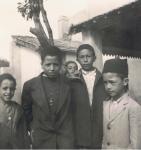- Accès directs
Decolonization and postcolonial issues of childhood and youth (1945-1980)Call for contribution, Maison de la recherche Germaine Tillion, Angers
31jan2018
While young people played a large role in building colonial empires, they were also an essential concern in decolonization. Indeed, the emancipation process of colonized peoples in the second half of the twentieth century raised with great force the social and political issue of children and young people in the colonial and post-colonial context, both in newly-independent and ex-colonizing countries. In a complex set of political and diplomatic, economic and social, demographic and populationist, philosophical and religious questions, colonial and post-colonial issues surrounding children and young people gave rise to specific biopolitics.
Colonial projects attributed great socio-political importance to caring for the children and adolescents left to their fate for economic or racialist reasons. The European presence in Asia and Africa generated romantic or non-consensual, passing or lasting relationships out of which were born mixed-race babies, who became the subjects of race policies implemented by States. Against the anticolonialist political commitments of the youth, colonial powers deployed social action as much as they mobilized their coercive, repressive machines. As the independence of colonies approached, "saving" the children became an objective of those promoting "new" colonial societies. Hoping to delay what was becoming more and more inevitable and/or to prolong the colonial adventure, the sycophants of colonialism organized forced migrations – sometimes presented as "repatriations" – of thousands of Asian and African children towards Europe. Mothers were separated from their children, fathers were ignorant of the fate of their children and that of the mothers, siblings were separated, and children were uprooted.
The study of these different processes – in the manner of Colonial and Post-colonial Studies – examines the interconnections between decolonization and colonization, the protraction of one or the other, and post-colonial cultures. The biopolitical dimension is equally significant in policies of integration or assimilation, the acquisition of nationality and citizenship, and the assignment of children and young people as go-betweens with the lost colony. Children and young people were subjects of policies desired or supported by biopowers and implemented by varied protagonists such as armies, organizations, humanitarians, colonialists, activists, or regular citizens.
The complex realities included in the theme of this symposium can be studied through very diverse sources. Apart from public archives which reflect the different policies undertaken, written and oral sources from charities or other organizations make it possible to better understand the roles played by non-governmental actors. The more or less critical accounts of those who were directly concerned by this history – in other words the children and young people themselves – are irreplaceable and will be cited at the symposium.
Main topics
Abstracts could cover the two spaces/times covered by the symposium: colonial and post-colonial contexts, in decolonizing societies as well as in colonizing countries. They could principally deal with, but are not limited to, the following list or themes:
- Debates over and practices of raising children, educating young people, youth movements, leisure, and models of supervision.
- Public health campaigns and their actors, the prevention and treatment of juvenile delinquency.
- The gendered dimension of caring for children, adoptions of children born in the colonies.
- The empowerment of young people in colonial and post-colonial situations, their activism, their political and ideological commitments.
- Access to rights, nationality and citizenship.
An approach through images is of course possible.
Individuals' life experiences and memoirs as well as their personal development will be a particular focus.
Submission guidelines
The suggestions, in French or English (one page maximum), are to be sent in
before January 2018 31th,
with a short CV enclosed, atyves.denechere@univ-angers.fr and blandine.charrier@univ-angers.fr
No fee will be asked of participants; the organisation will cover their lodging and meals.
Date : The 27-28th of June2018, Angers
Organisation
- Yves Denéchère, professor of Contemporary History, University of Angers, director of CERHIO (FRE CNRS), scientific head of EnJeu[x] program
- Blandine Charrier, coordinator of EnJeu[x] program, http://enfance-jeunesse.fr/
International scientific committee
- Nicolas Bancel (Université de Lausanne)
- Raphaëlle Branche (Université de Rouen)
- Christina E. Firpo (California Polytechnic State University)
- David M. Pomfret (The University of Hong Kong)
- Margarida Calafate Ribeiro (Universidade de Coimbra)
- Emmanuelle Saada (Columbia University)
Information
Contact : Blandine Charrier. Mail : blandine [dot] charrier [at] univ-angers [dot] fr
Quote this ad : « Décolonisation et enjeux post-coloniaux de l’enfance et de la jeunesse (1945-1980) », Appel à contribution, Calenda, Publié le vendredi 17 novembre 2017, http://calenda.org/422552







 2 Rue Vivienne - 75002 Paris
2 Rue Vivienne - 75002 Paris
